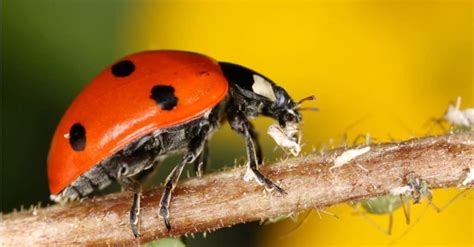Ladybugs, also known as lady beetles or ladybird beetles, are a type of insect that is commonly found in gardens and meadows. They are known for their bright colors and are often considered to be beneficial insects because they feed on aphids and other pests that can harm plants. However, some ladybugs, including the orange ladybug, have a reputation for being poisonous. But is this really true?
Here are five facts about orange ladybugs and their potential toxicity:
Fact #1: Orange Ladybugs Can Secrete a Foul-Tasting Fluid

When threatened or disturbed, orange ladybugs can secrete a foul-tasting fluid from their leg joints. This fluid, which is often yellow or orange in color, is meant to deter predators from feeding on the ladybugs. The fluid is not necessarily poisonous, but it can be quite unpleasant to taste and smell.
What is the purpose of this fluid?
The fluid secreted by orange ladybugs is primarily used as a defense mechanism to protect them from predators. The fluid is often accompanied by a warning coloration, such as the bright orange or yellow color of the ladybug's body, which serves to alert potential predators to the ladybug's distasteful taste.
Fact #2: Some Ladybugs Can Be Toxic to Pets

While orange ladybugs are not typically poisonous to humans, they can be toxic to pets if ingested. If a pet, such as a dog or cat, were to eat a large number of orange ladybugs, it could potentially cause gastrointestinal upset, including vomiting and diarrhea.
What should I do if my pet ingests a ladybug?
If you suspect that your pet has ingested a ladybug, it's best to monitor their behavior and watch for any signs of illness. If your pet begins to show symptoms of gastrointestinal upset, such as vomiting or diarrhea, it's best to consult with a veterinarian for advice.
Fact #3: Orange Ladybugs Are Not Typically Poisonous to Humans

While orange ladybugs can secrete a foul-tasting fluid, they are not typically poisonous to humans. The fluid secreted by the ladybugs is not toxic to humans and is primarily used as a defense mechanism to protect the ladybugs from predators.
Are there any exceptions?
While orange ladybugs are not typically poisonous to humans, there is one exception. Some people may experience an allergic reaction to the ladybug's fluid, which can cause symptoms such as redness, itching, and swelling.
Fact #4: Orange Ladybugs Can Be Beneficial to Gardens

Orange ladybugs are beneficial to gardens because they feed on aphids and other pests that can harm plants. Ladybugs are natural predators of aphids and can help to control infestations without the use of pesticides.
How can I attract ladybugs to my garden?
To attract ladybugs to your garden, you can plant a variety of flowers that provide nectar and pollen, such as marigolds and cosmos. You can also provide a source of water, such as a shallow dish or birdbath, and avoid using pesticides, which can harm ladybugs and other beneficial insects.
Fact #5: Orange Ladybugs Can Be Used as a Natural Pest Control

Orange ladybugs can be used as a natural pest control method to control aphid infestations. Ladybugs are natural predators of aphids and can help to control infestations without the use of pesticides.
How can I use ladybugs as a natural pest control?
To use ladybugs as a natural pest control method, you can purchase ladybugs from a reputable supplier and release them in your garden. Ladybugs are most effective when released in large numbers, so it's best to purchase a large quantity of ladybugs to ensure effective control.






We hope you found these facts about orange ladybugs interesting and informative. Whether you're a gardener looking for a natural pest control method or simply someone who's curious about these fascinating insects, we're sure you'll find something to appreciate about orange ladybugs.
Do you have any questions about orange ladybugs?
If you have any questions about orange ladybugs or would like to share your own experiences with these fascinating insects, please leave a comment below. We'd love to hear from you!
Are orange ladybugs poisonous to humans?
+No, orange ladybugs are not typically poisonous to humans. While they can secrete a foul-tasting fluid, this fluid is not toxic to humans and is primarily used as a defense mechanism to protect the ladybugs from predators.
Can orange ladybugs be used as a natural pest control method?
+Yes, orange ladybugs can be used as a natural pest control method to control aphid infestations. Ladybugs are natural predators of aphids and can help to control infestations without the use of pesticides.
How can I attract orange ladybugs to my garden?
+To attract orange ladybugs to your garden, you can plant a variety of flowers that provide nectar and pollen, such as marigolds and cosmos. You can also provide a source of water, such as a shallow dish or birdbath, and avoid using pesticides, which can harm ladybugs and other beneficial insects.
